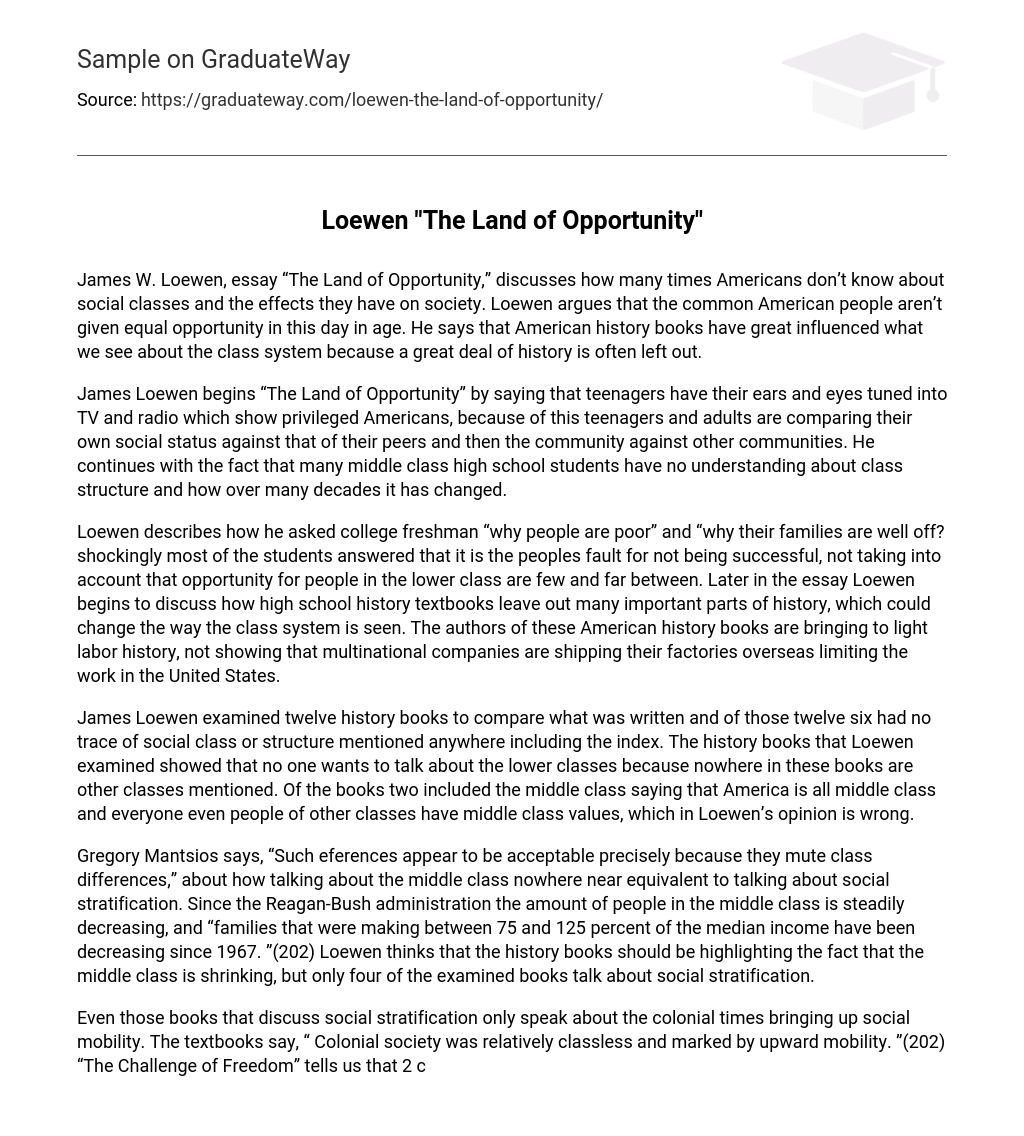James W. Loewen, essay “The Land of Opportunity,” discusses how many times Americans don’t know about social classes and the effects they have on society. Loewen argues that the common American people aren’t given equal opportunity in this day in age. He says that American history books have great influenced what we see about the class system because a great deal of history is often left out.
James Loewen begins “The Land of Opportunity” by saying that teenagers have their ears and eyes tuned into TV and radio which show privileged Americans, because of this teenagers and adults are comparing their own social status against that of their peers and then the community against other communities. He continues with the fact that many middle class high school students have no understanding about class structure and how over many decades it has changed.
Loewen describes how he asked college freshman “why people are poor” and “why their families are well off? shockingly most of the students answered that it is the peoples fault for not being successful, not taking into account that opportunity for people in the lower class are few and far between. Later in the essay Loewen begins to discuss how high school history textbooks leave out many important parts of history, which could change the way the class system is seen. The authors of these American history books are bringing to light labor history, not showing that multinational companies are shipping their factories overseas limiting the work in the United States.
James Loewen examined twelve history books to compare what was written and of those twelve six had no trace of social class or structure mentioned anywhere including the index. The history books that Loewen examined showed that no one wants to talk about the lower classes because nowhere in these books are other classes mentioned. Of the books two included the middle class saying that America is all middle class and everyone even people of other classes have middle class values, which in Loewen’s opinion is wrong.
Gregory Mantsios says, “Such eferences appear to be acceptable precisely because they mute class differences,” about how talking about the middle class nowhere near equivalent to talking about social stratification. Since the Reagan-Bush administration the amount of people in the middle class is steadily decreasing, and “families that were making between 75 and 125 percent of the median income have been decreasing since 1967. ”(202) Loewen thinks that the history books should be highlighting the fact that the middle class is shrinking, but only four of the examined books talk about social stratification.
Even those books that discuss social stratification only speak about the colonial times bringing up social mobility. The textbooks say, “ Colonial society was relatively classless and marked by upward mobility. ”(202) “The Challenge of Freedom” tells us that 2 classes have withered away and now more than ever we are a middle class society. Loewen goes over that these textbooks do not show the “class inequalities that still existed or the barriers around social mobility. ” (203) “The Land of Promise” asks, “What conditions made it possible for poor immigrants to become richer in the colonies? as well as “what conditions made/make it difficult? ” Both questions go unanswered. Most preachers coined the phrase “men start with humble origins and attain the most elevated positions. Loewen feels like social class is the most important variable in society. He goes on to describe that a higher class expecting women is more likely to seek medical help and enjoy her pregnancy, whereas a woman from the working class simply does not have the time or the means to seek medical attention right away.
Loewen says the babies born into household that are well off, will be healthier and babies born into poor families will be in a very different situation. (203) Children who grow up in a poor area go to school where there are 50 kids in one class and individual attention is never given, and children of high class families will go to schools that have smaller class sizes and individual attention. Even when a poor child goes to a better schoolteachers will question if the work done is their own and also only expect hard work from the rich kids. if you are a child of low income parents, the chances are good that you will receive limited and often careless attention from adults in your high school. ” Theodore Sizer “Horace’s Compromise,” “If you are the child of upper-middle income parents, the chances are good that you will receive substantial and careful attention. ” (203) These quotes from another author showcase that school in America is often times based on the social standing of the parents.
In high school often times to prepare for college rich students will enroll in prep classes , but will already have an advantage because they are like the makers of the tests, having similar backgrounds can help with the test. Students who enroll in these prep classes are more likely to get higher scores and get into better colleges, which can lead them into white-collar jobs where the cycle can repeat itself. Students who come from poor families will be less likely to prep for the tests, and get lower scores which will land them a blue-collar job just like the rest of their family.
Finally people with high-class families have high life expectancy than those of lower- working class families simply because they have access to better health care. Loewen sees America as untruthful or ignorant to what is really going on around us. He thinks that the most important facts that are left out of history books are those about social upbringing and class status. He recognizes the difference between classes and the affect that has on all of the people we encounter in life.





